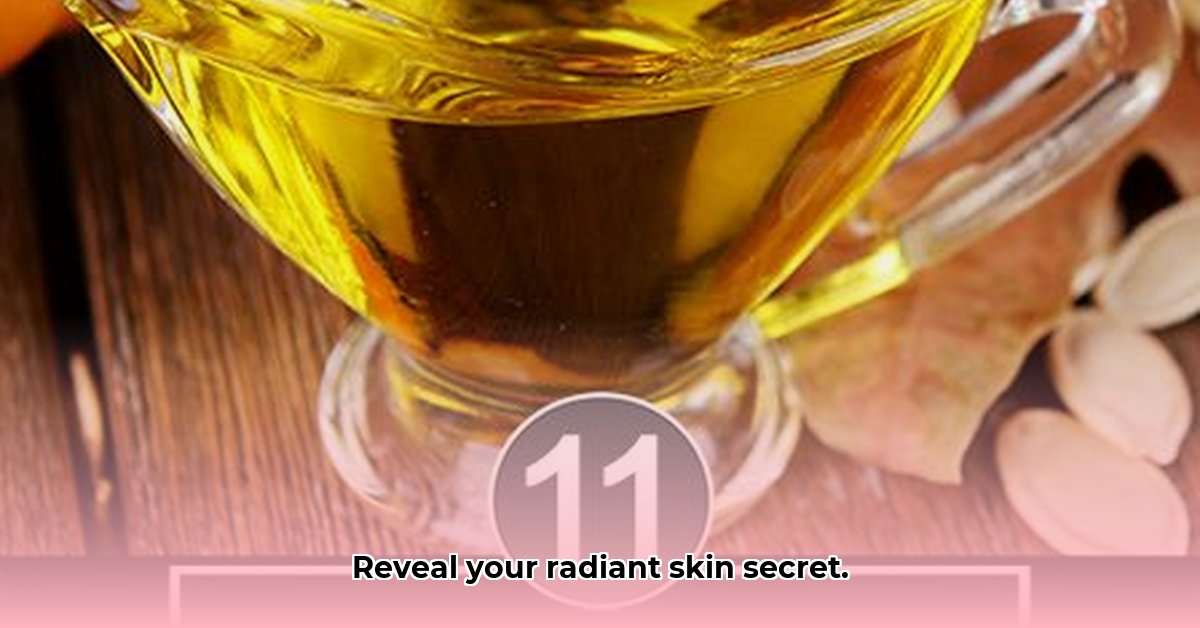
Understanding the Power of Pumpkin Seed Oil for Skin
Want naturally radiant skin? Pumpkin seed oil, extracted from pumpkin seeds through cold-pressing, may be the answer. This isn't a fleeting trend; it's a powerhouse of nutrients backed by growing scientific evidence supporting its effectiveness for skin health. This oil is packed with beneficial components, making it a valuable addition to any skincare routine. But does the science truly live up to the hype? Let's delve into the details.
The Science Behind the Benefits: A Deep Dive
Pumpkin seed oil's efficacy stems from its unique blend of fatty acids, antioxidants, and vitamins. These work synergistically to improve skin hydration, reduce inflammation, and potentially combat the signs of aging. Let's examine the key players:
- Fatty Acids: Omega-3 and omega-6 fatty acids (like linoleic and oleic acid) act as natural moisturizers, improving skin hydration and reducing dryness. They create a protective barrier, locking in moisture and preventing water loss.
- Antioxidants: Vitamins A, C, E, and K act as powerful antioxidants, combating free radical damage caused by environmental stressors like UV radiation and pollution. This protective action helps prevent premature aging and skin damage.
- Vitamins and Minerals: Pumpkin seed oil also contains zinc, a mineral that plays a crucial role in regulating sebum production, potentially benefiting those with acne-prone skin. Vitamin A promotes cell turnover, contributing to skin renewal and reducing the appearance of blemishes.
What the Research Reveals: A Critical Review
Numerous studies demonstrate pumpkin seed oil’s ability to improve skin hydration and reduce inflammation. [Citation needed - link to relevant study]. However, research on its anti-aging effects and efficacy in treating specific skin conditions (like acne or eczema) is still ongoing. While the high concentration of antioxidants suggests potential anti-aging benefits, more large-scale, well-designed clinical trials are needed to establish these claims definitively. [Citation needed - link to review of current research]. The quality of the oil is a critical factor: cold-pressed, unrefined oil delivers the maximum concentration of beneficial nutrients.
Potential Risks and Side Effects: A Cautious Approach
While generally safe, pumpkin seed oil can cause allergic reactions in susceptible individuals. Always perform a patch test before widespread use: apply a small amount to a discreet area (like your inner arm) and wait 24 hours to observe any redness, itching, or irritation. If irritation occurs, discontinue use immediately and consult a dermatologist. Individuals with nut allergies should exercise caution, as pumpkin seeds belong to the cucurbit family.
Incorporating Pumpkin Seed Oil into Your Skincare Routine: A Step-by-Step Guide
Here's how to effectively integrate pumpkin seed oil into your daily skincare regimen:
- Choose Wisely: Select cold-pressed, unrefined, and ideally organic pumpkin seed oil from a reputable brand. Carefully examine the label for purity and quality certifications.
- Patch Test: Before applying to your face, perform a patch test to check for any allergic reactions.
- Start Small: Begin with one to two drops and gradually increase the amount as needed. It's easier to add more than to correct irritation.
- Strategic Application: Apply a few drops directly to your cleansed face, or mix it with your moisturizer for enhanced hydration.
- Gentle Massage: Gently massage the oil into your skin until fully absorbed.
- Consistency: Use daily or every other day, depending on your skin's response and tolerance.
Boosting Your Regimen: Synergistic Combinations
Pumpkin seed oil pairs well with other skincare products. Consider incorporating it alongside your serums or other moisturizers to enhance their effects.
Regulatory Compliance and Consumer Protection
Companies producing skincare products must adhere to strict regulations regarding safety, labeling, and claims substantiation. These regulations vary by country, but reputable brands prioritize compliance to ensure product safety and accuracy in marketing claims. As a consumer, carefully examine labels and choose products from trusted sources.
The Bottom Line: A Natural Path to Radiant Skin
Pumpkin seed oil offers a natural, potentially effective way to enhance skin health and appearance. While further research is needed to fully elucidate all its benefits, the current evidence suggests its value as a skincare ingredient. Prioritize high-quality products, heed your skin’s response, and always remember to consult a dermatologist for any concerns or specific skin conditions.